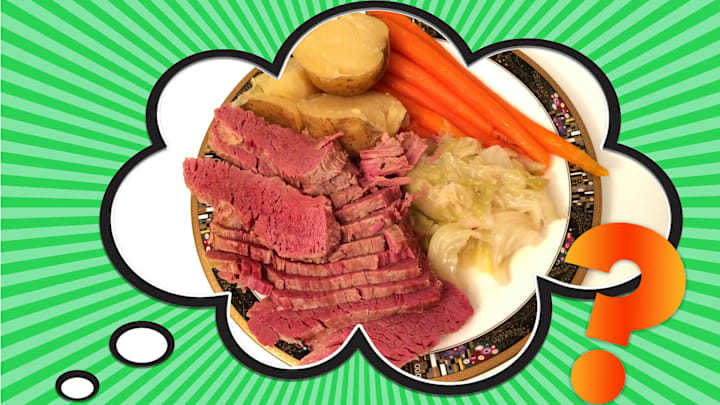Creamed corn. Cornbread. Cornmeal. Corned beef. One of these things is not like the others. Not only does corned beef contain zero corn, but corn isn’t even involved in the process of preparing it. So why do we call it that?
In short, because the word corn doesn’t only refer to the golden yellow cereal grain that comes from a cob.
As far back as the late 9th century, according to the Oxford English Dictionary, people were using corn to describe a “small hard particle” of any grainy substance like sand or salt. By the 16th century, preserving meat or other food items with (corns of) salt had become known as “corning” it.
Pork was corned, fish was corned, and, naturally, so was beef. But corned beef wasn’t actually that common in Ireland until the mid-17th century. Basically, beef-loving Great Britain had cultivated a roaring cattle industry in Ireland, whose general population had mainly been using cows for farm labor and dairy products. According to Smithsonian Magazine, exporters brought tens of thousands of live cows from Ireland to England annually. This hurt the business of England’s own cattle herders.
So, in the mid-17th century, the British government passed a series of so-called Cattle Acts that restricted and then prohibited the importation of Irish cattle. Luckily, Ireland had salt in spades—their salt tax was a fraction of England’s—so everyone just started corning the beef and exporting that to England (and eventually other countries, too).
That said, Irish people themselves weren’t really eating the stuff—they favored much cheaper salt pork instead. That didn’t change until the early 19th century, when high pork prices in the U.S. prompted Irish immigrants to seek out a more affordable alternative. They found it in Jewish delis, where corned beef was a mainstay. Corned beef and cabbage became the de facto dish of St. Patrick’s Day in America—but if you’re celebrating in Ireland, pork is still the way to go.
Have you got a Big Question you’d like us to answer? If so, let us know by emailing us at bigquestions@mentalfloss.com.
